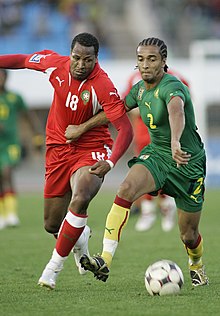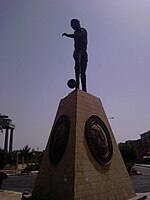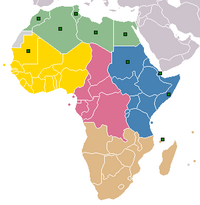Portal:Football in Africa
Introduction
Football is the most popular sport in Africa, alongside basketball. Indeed, football is probably the most popular sport in almost every African country, although rugby and cricket are also very popular in South Africa. The first football stadium to be built in Africa was the Alexandria Stadium in 1929.
The English Premier League is the most popular sports league in Africa. The most popular clubs in Africa are Arsenal, Chelsea and Manchester United. (Full article...)
This section may be unbalanced toward certain viewpoints. (October 2022) |
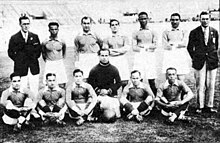
Selected article -
Nigeria, and South Africa. following formal discussions between the aforementioned associations at the FIFA Congress held on 7 June 1956 at Avenida Hotel in Lisbon, Portugal.
Representing the African confederation of FIFA, CAF organizes runs and regulates national team and club continental competitions annually or biennially such as the Africa Cup of Nations and Women's Africa Cup of Nations, which they control the prize money and broadcast rights to. CAF will be allocated 9 spots at the FIFA World Cup starting from 2026 and could have an opportunity of 10 spots with the addition of an intercontinental play-off tournament involving 6 teams to decide the last 2 FIFA World Cup places (46+2).
Selected biography -
Mariga moved to the Serie A club Parma initially on loan in August 2007. The Italian club had an option to buy him in the summer for a fee of 20 million Swedish kronor (around €2 million). Heagreed to a four-year deal to keep him at Serie A side Parma for four years until the end of June 2012, after the club paid a transfer fee for 18 million Swedish Kronor (approx. €1.94 million). In January 2010 he was set to sign for English Premier League club Manchester City, but failed to obtain a work permit. Had Mariga successfully signed for Manchester City, he would have been the first player from the East African country to sign for a club in the top English league - a milestone later achieved by his brother Victor Wanyama, upon his transfer to Southampton in July 2013.
On 1 February 2010, the last day of the transfer window, Mariga moved to Inter Milan in a co-ownership deal. Following the move, Inter president Massimo Moratti hailed Mariga's move as the "best thing that could have happened" to the club in the January transfer window. On 17 June 2010, Inter bought him outright and bought back Biabiany for a reported fee around €10 million. At the start of the 2011–12 season Mariga was loaned out to La Liga club Real Sociedad. It meant Inter had a non-EU transfer quota which they used on winter signing Juan and Fredy Guarín (the other quota was obtained from Philippe Coutinho). As Mariga was unable to return to Inter, he was loaned back to Parma instead for the 2012–13 season and he scored his only goal against Lazio. He returned to Inter Milan at the end of the season, and was released by the club in May 2014. He rejoined Parma on 4 September 2014 before being released after the club went bankrupt in March 2015 and joining Latina in January 2016. On 31 July 2017, Mariga signed a one-year deal with Spanish Segunda División club Real Oviedo.
Selected image -
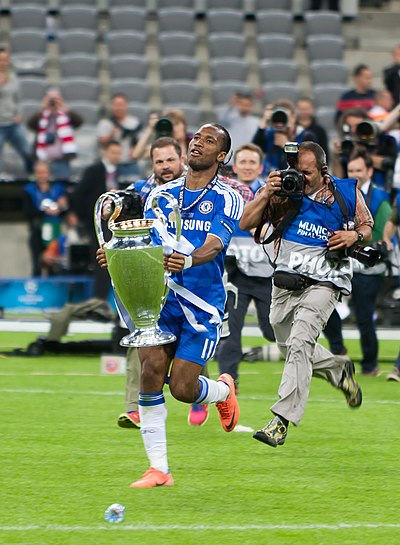 |
Didier Drogba holding the European Cup following Chelsea's penalty shootout victory over Bayern Munich
Subcategories
Related portals
More sports portals
WikiProjects
Related task forces and sub-projects
African football task force
WikiProject Africa • WikiProject Football
WikiProject Football task forces and sub-projects
 | |
| Wikipedia ads | file info – #250 |
Topics
Open tasks

- Expand stubs: Competitions in Africa • Organizations
- Expand club articles of teams from Africa.
- Expand biographies of Africans involved in football.
- Create: Requested articles • Most wanted football articles • Requested general football articles
- Add: Infoboxes • Images (General requests, Requested images of people)
- Review: articles currently under review
- Assess: Assessment requests • Assess an article
- Revert vandalism on this portal and on African football articles
- Assist in maintaining this portal and keeping its selected content up to date.
- WikiNews: Create and submit news stories about African football for Wikipedia's sister project WikiNews.
Associated Wikimedia
The following Wikimedia Foundation sister projects provide more on this subject:
-
Commons
Free media repository -
Wikibooks
Free textbooks and manuals -
Wikidata
Free knowledge base -
Wikinews
Free-content news -
Wikiquote
Collection of quotations -
Wikisource
Free-content library -
Wikiversity
Free learning tools -
Wiktionary
Dictionary and thesaurus
More portals
Sources

- ^ "The History Of Soccer In Africa". NPR.org. 2010-06-09. Retrieved 2016-03-31.
- ^ a b c Alegi, Peter (2010). African Soccerscapes. Ohio University Press. pp. 1–2. ISBN 9780896802780.
- ^ Frimpong, Enoch Darfah. "Ghana news: A world of superstition, frustration and disillusionment - Graphic Online". Retrieved 23 September 2017.
- ^ Lacey, Marc (8 August 2002). "Kangemi Journal; For Spellbinding Soccer, the Juju Man's on the Ball". The New York Times. NY Times. Retrieved 2016-03-31.
- ^ "World Cup Witchcraft: Africa Teams Turn to Magic for Aid". National Geographic. Archived from the original on July 10, 2006. Retrieved 2016-03-31.
- ^ Andy Mitten (September 2010). The Rough Guide to Cult Football. Rough Guides UK. ISBN 9781405387965. Retrieved 2016-04-02.
- ^ "African Nations Cup overshadowed by hocus pocus | Football". The Guardian. Retrieved 2016-04-09.
- ^ Kuper, Simon (2006). Soccer Against the Enemy: How the World's Most Popular Sport Starts and Stops Wars, Fuels Revolutions, and Keeps Dictators in Power. Nation Books. p. 123. ISBN 978-1-56025-878-0.


